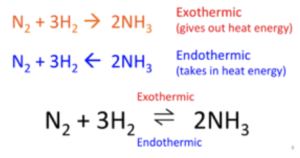Energy Changes (GCSE Chemistry)
Energy Changes
Endothermic and Exothermic Reactions
The Effect of Temperature Changes
- Temperature changes affect reactions. Certain reversible reactions are affected by temperature changes. As these reactions occur in both directions, one direction is endothermic, whilst the other direction is exothermic.
- Energy is transferred in reversible reactions. As with any reaction, energy can be transferred in a reversible reaction. Energy is taken in from the surroundings in the endothermic direction, whilst the same amount of energy is given out to the surroundings in the exothermic direction.

Reversible Reaction: Heating Hydrated Copper Sulphate
It is important that you can describe the reversible reaction involving the heating of hydrated copper sulphate, which is a blue solid.

The forward reaction forms anhydrous copper sulphate, which is a white powder. This reaction is endothermic.
The opposite reaction forms hydrated copper sulphate, which are blue crystals. This reaction is exothermic.





Still got a question? Leave a comment
Leave a comment